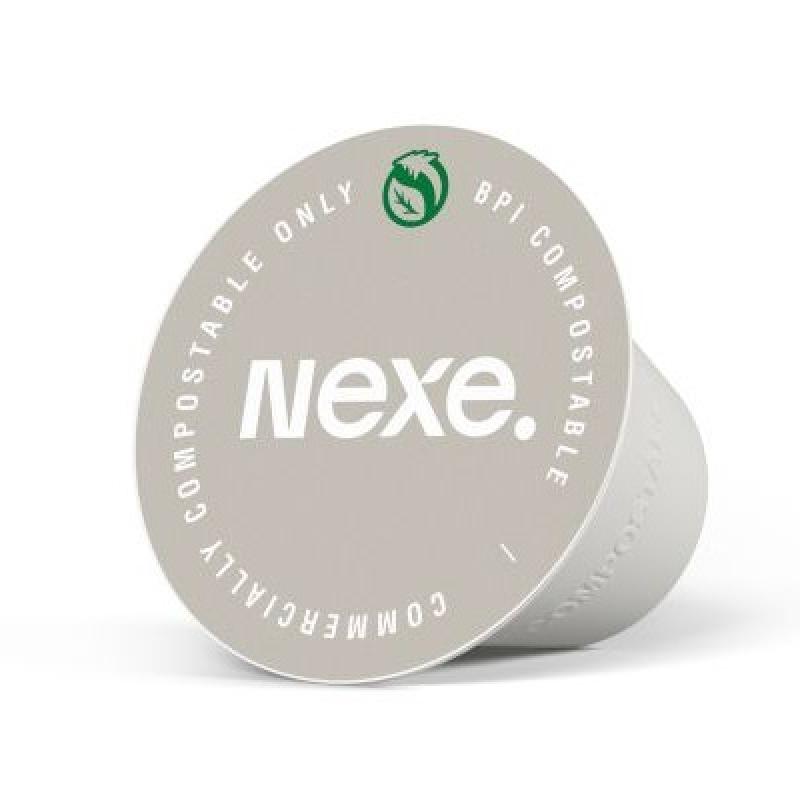
A more guilt-free K-Cup is being made possible by NEXE Innovations Inc. (NEXE-X), a Canadian company that makes compostable coffee pods and dreams of eliminating single-use plastics altogether.
Its NEXE Pod, a single-use pod for Keurig coffee machines, is made out of a proprietary plant-based blend that retains the properties of a plastic pod.
“We’re helping the theme of convenience with the K-Cup but we’re also bringing an environmental factor to it,” Ash Guglani, the company’s president, said in an interview with Sustainable Biz Canada.
Unlike plastic pods, which are mostly destined for landfills and likely to remain for hundreds of years, the NEXE version is designed to break down in a composting site within 90 days.
Made in its 54,000-square-foot Windsor, Ont. facility with the capacity of producing up to 500 million pods and other biodegradable products per year, the coffee containers are just a starting point for NEXE. Company management has plans to move into other single-use products.
The wastefulness of K-Cups
Keurig users who brew their coffee with K-Cups may be aware of the waste each one creates.
Consumed in the billions per year in Canada according to one estimate, the small, thimble-shaped coffee containers are convenient, dispensing a steaming hot cup of joe within seconds. But they contribute to a global plastic problem.
Usable only once, the pod has to be tossed away, accumulating in dumps. Once left to linger in a landfill, the pods will emit planet-warming greenhouse gases as they decompose. Some will be incinerated, polluting the local environment and potentially also creating a health hazard.
The inventor of the K-Cup, John Sylvan, expressed his regret at developing the product, frustrated by the billions of pods that are binned per year and questioning the purported recyclability of the pods.
Though Keurig has claimed the plastic is recyclable once the metallic lid and coffee grounds are removed, K-Cups are not accepted by most Canadian recycling programs outside of British Columbia and Quebec. Keurig has paid fines in Canada and the U.S. for misrepresenting the recyclability of the pods.
Enter NEXE - which is an independent company not affiliated with Keurig.
Co-founder and CEO Darren Footz, a coffee entrepreneur, caught wind of this issue and sought to reduce the plastic waste from K-Cups, Guglani said. In 2015 he joined forces with Guglani, a former Canadian investment bank employee, to form the company.
Price competitive plant-based material
Using a resin made from plant-based materials such as a bioplastic derived from corn chaff, the NEXE Pod is 100 per cent compostable and withstands the high temperatures and pressure of a Keurig machine without breaking down, Guglani said.
The pods are certified by BPI, a North American third-party organization that identifies a product as compostable.
If tossed in an organic bin, it means the pod and coffee grinds will likely end up being composted, which reduces the global warming potential – the potency of the greenhouse gas over time – from the pod compared to a landfill.
“Most of the plastic that’s out there that they say is going to be recycled does not get recycled, so I think at least for the single-serve pod market I think we have the best technology out there,” Guglani said.
Key to its pod is competing with the price of plastic, the president said, which its biodegradable material can match. As a vertically integrated business, NEXE controls its supply chain and makes most of its components in-house, which enables it to be competitive with plastic, Guglani said.
While he has seen reports claiming consumers are willing to pay more for sustainable products, he has yet to see this trend materialize in the coffee business.
“If we cannot compete with plastic on pricing, we don’t have a business.”
The company’s clients are interested in what it offers because they are seeking sustainable pods, and it is in a good position to secure larger customers, he added.
Focusing on the business-to-business segment of the coffee industry, NEXE has forged partnerships with roasters like Bridgehead Coffee, EKOCUPS and ecoBeans Coffee Inc. For ecoBeans, it is fulfilling its second purchase order; with Bridgehead, its third.
Doing away with single-use plastics
To meet the company’s ambition of addressing all single-use plastics, Guglani said NEXE plans to expand into other segments such as food, cosmetics and medical.
NEXE is also not done with a cup of coffee. Guglani said the company has its sights set on a compostable substitute to the Nespresso pods that are very similar to K-Cups.
“Right now, we are focused on just scaling this, becoming as disruptive as possible and just eliminating plastic use.”










